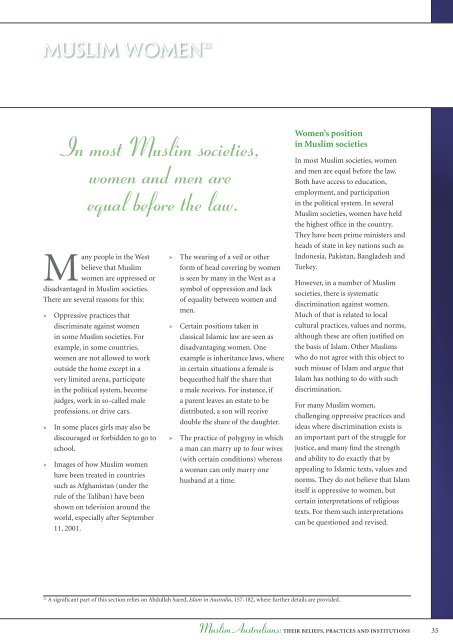Muslim Australians - Religion Cultural Diversity Resource Manual
http://www.islamicglobe.com
http://www.islamicglobe.com
Create successful ePaper yourself
Turn your PDF publications into a flip-book with our unique Google optimized e-Paper software.
MUSLIM WOMEN 22<br />
In most <strong>Muslim</strong> societies,<br />
women and men are<br />
equal before the law.<br />
Many people in the West<br />
believe that <strong>Muslim</strong><br />
women are oppressed or<br />
disadvantaged in <strong>Muslim</strong> societies.<br />
There are several reasons for this:<br />
» Oppressive practices that<br />
discriminate against women<br />
in some <strong>Muslim</strong> societies. For<br />
example, in some countries,<br />
women are not allowed to work<br />
outside the home except in a<br />
very limited arena, participate<br />
in the political system, become<br />
judges, work in so-called male<br />
professions, or drive cars.<br />
» In some places girls may also be<br />
discouraged or forbidden to go to<br />
school.<br />
» Images of how <strong>Muslim</strong> women<br />
have been treated in countries<br />
such as Afghanistan (under the<br />
rule of the Taliban) have been<br />
shown on television around the<br />
world, especially after September<br />
11, 2001.<br />
» The wearing of a veil or other<br />
form of head covering by women<br />
is seen by many in the West as a<br />
symbol of oppression and lack<br />
of equality between women and<br />
men.<br />
» Certain positions taken in<br />
classical Islamic law are seen as<br />
disadvantaging women. One<br />
example is inheritance laws, where<br />
in certain situations a female is<br />
bequeathed half the share that<br />
a male receives. For instance, if<br />
a parent leaves an estate to be<br />
distributed, a son will receive<br />
double the share of the daughter.<br />
» The practice of polygyny in which<br />
a man can marry up to four wives<br />
(with certain conditions) whereas<br />
a woman can only marry one<br />
husband at a time.<br />
Women’s position<br />
in <strong>Muslim</strong> societies<br />
In most <strong>Muslim</strong> societies, women<br />
and men are equal before the law.<br />
Both have access to education,<br />
employment, and participation<br />
in the political system. In several<br />
<strong>Muslim</strong> societies, women have held<br />
the highest office in the country.<br />
They have been prime ministers and<br />
heads of state in key nations such as<br />
Indonesia, Pakistan, Bangladesh and<br />
Turkey.<br />
However, in a number of <strong>Muslim</strong><br />
societies, there is systematic<br />
discrimination against women.<br />
Much of that is related to local<br />
cultural practices, values and norms,<br />
although these are often justified on<br />
the basis of Islam. Other <strong>Muslim</strong>s<br />
who do not agree with this object to<br />
such misuse of Islam and argue that<br />
Islam has nothing to do with such<br />
discrimination.<br />
For many <strong>Muslim</strong> women,<br />
challenging oppressive practices and<br />
ideas where discrimination exists is<br />
an important part of the struggle for<br />
justice, and many find the strength<br />
and ability to do exactly that by<br />
appealing to Islamic texts, values and<br />
norms. They do not believe that Islam<br />
itself is oppressive to women, but<br />
certain interpretations of religious<br />
texts. For them such interpretations<br />
can be questioned and revised.<br />
22<br />
A significant part of this section relies on Abdullah Saeed, Islam in Australia, 157-182, where further details are provided.<br />
<strong>Muslim</strong> <strong>Australians</strong>:THEIR BELIEFS, PRACTICES AND INSTITUTIONS 35














